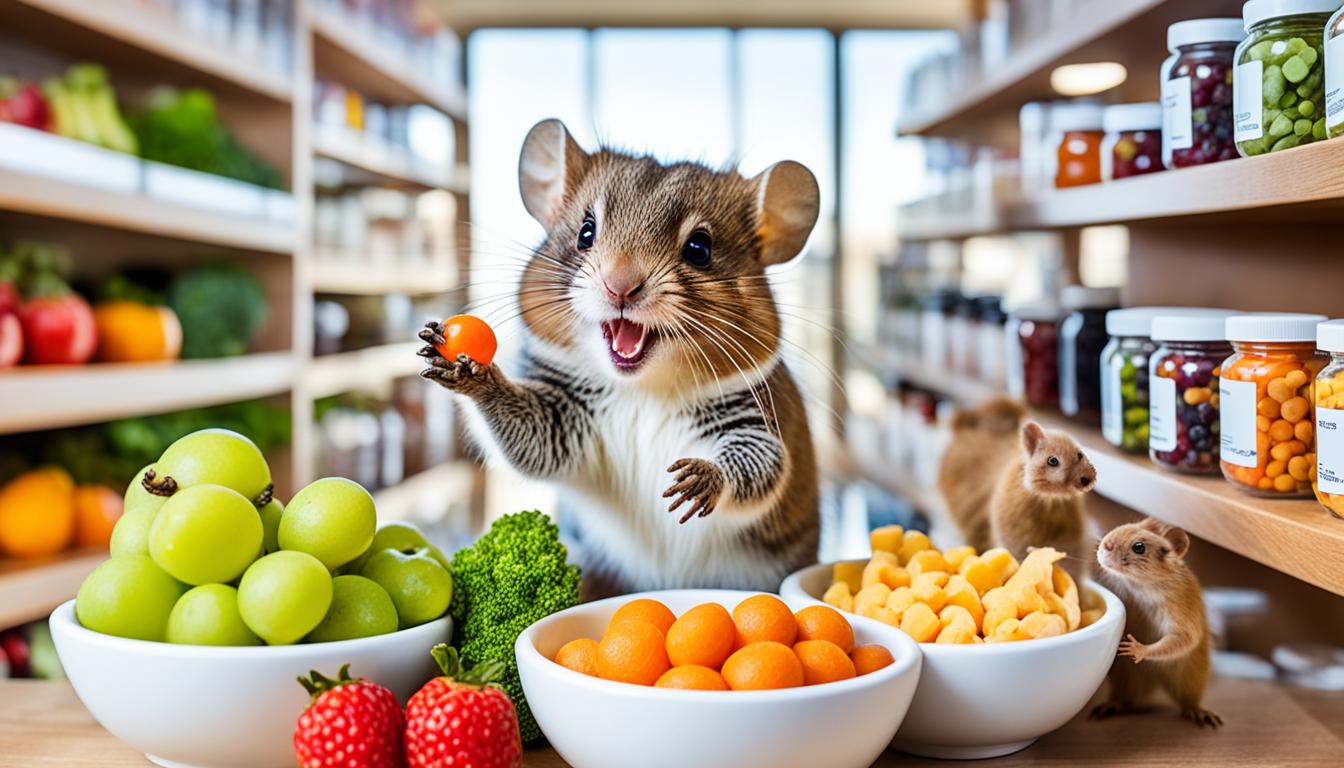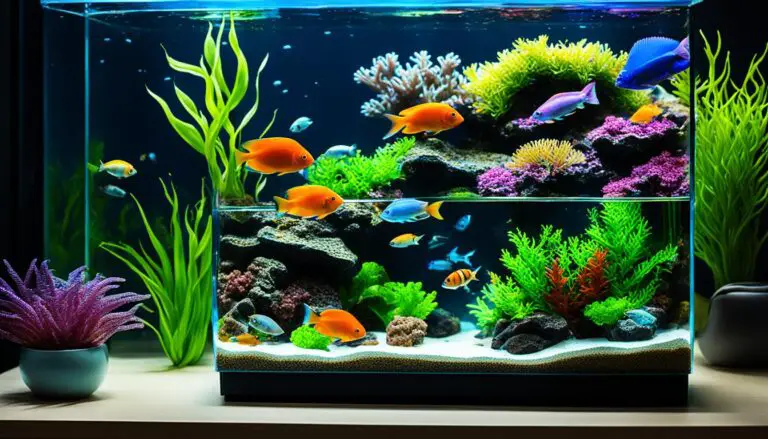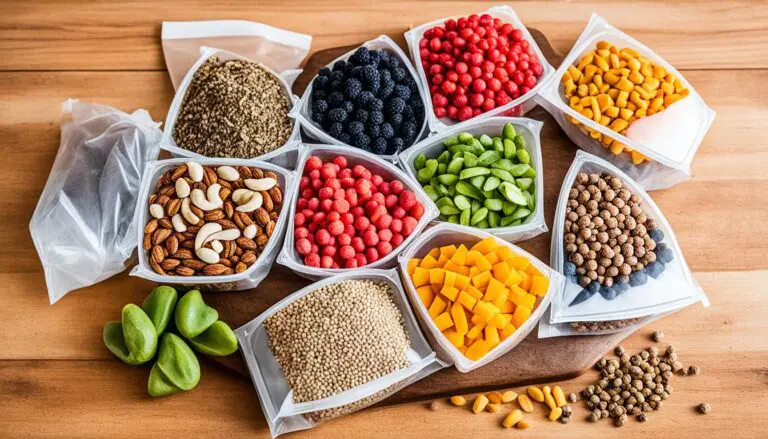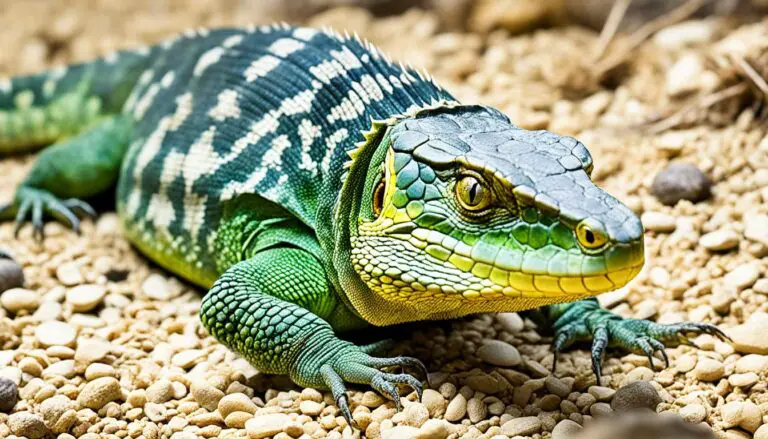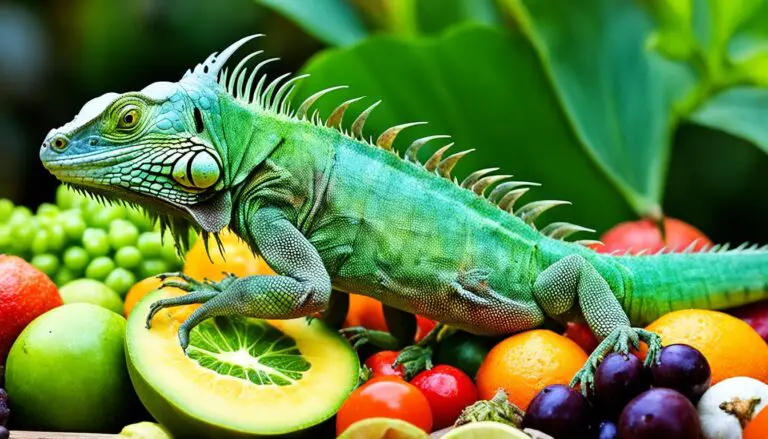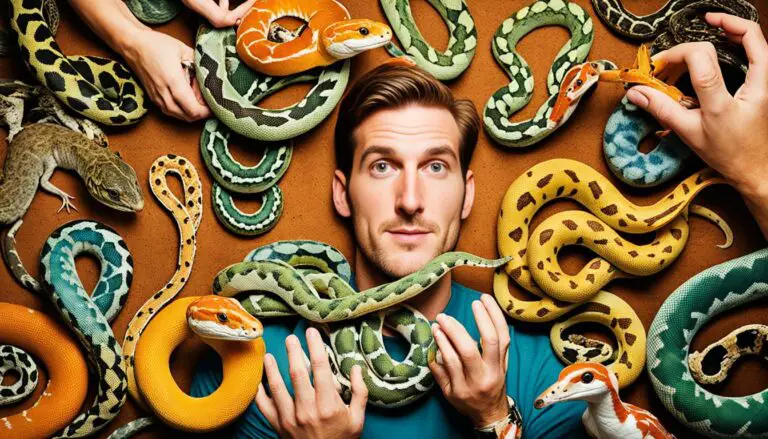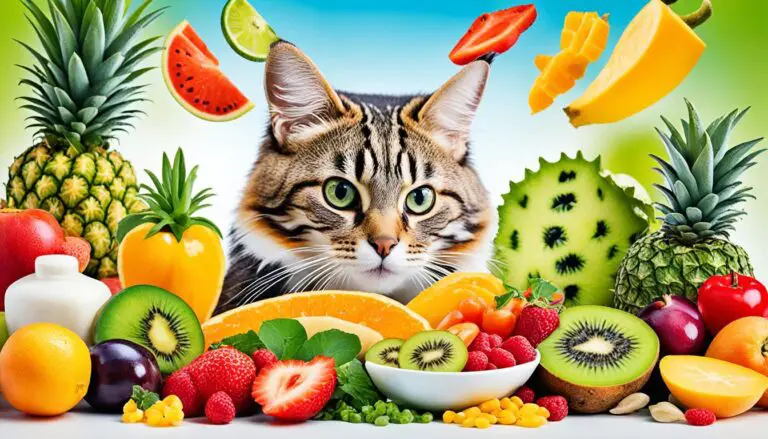Vitamin C Supplementation for Small Mammals
Did you know guinea pigs and other small animals can’t make their own vitamin C? It’s a surprising fact. This makes adding vitamin C to their diet very important. We will look at why vitamin C is key for small animals like guinea pigs. And we’ll cover the benefits of giving them extra vitamin C. Plus, we will show you how to pick the best supplement for your pet.
Key Takeaways:
- Vitamin C supplementation is crucial for guinea pigs and other small mammals that cannot produce their own vitamin C.
- Supplementing with vitamin C helps prevent deficiency-related health issues.
- Guinea pigs, rabbits, chinchillas, hamsters, and rodents can all benefit from vitamin C supplements.
- The recommended daily intake of vitamin C varies depending on the type of small pet.
- Choosing a high-quality and stable vitamin C supplement is important for optimal results.
Why Is Vitamin C Important for Pets?
Vitamin C is vital for pets’ health. It helps the body make collagen. Collagen keeps their connective tissues strong. This includes bones, joints, tendons, and skin. With enough vitamin C, pets can stay active and healthy.
It also helps pets absorb iron well. Iron is crucial for making red blood cells. These cells carry oxygen in the blood. Good iron levels mean more energy for pets.
Vitamin C boosts the immune system too. This makes it easier for pets to fight off sickness. A strong immune system supports good health and keeps pets safe from diseases.
Most animals make their own vitamin C, but not all. Pets like guinea pigs cannot make it. They need vitamin C from their diet. Without enough, guinea pigs can get very sick. This illness can show as swollen joints or gums, and slow wound healing.
Adding vitamin C to pets’ diets helps them stay healthy. It makes sure they get all the nutrients they need.

| Vitamin C Benefits for Pets: |
|---|
| Collagen synthesis |
| Iron absorption |
| Immune function |
Vitamin C Supplements for Guinea Pigs
Guinea pigs can’t make their own vitamin C, which means they need extra. Foods for guinea pigs have some vitamin C, but it’s not always enough. So, giving them vitamin C tablets is key since the C levels in their food can vary.
Not enough vitamin C can harm guinea pigs. You might see bad skin, slow healing, or mouth sores. They could also eat less, move slower, and grow weak. To keep them healthy, vitamin C supplements are a must.
Pick top-notch vitamin C tablets made just for guinea pigs. These are sold in pet stores or online. It’s an easy way to make sure your guinea pig gets the vitamin C it needs every day.
If you’re starting a new supplement, talk to a vet first. They’ll help with the right dose and mix it into your pet’s food. Vets can also check your guinea pig’s health after you start the supplement.
A good diet is also vital for guinea pigs. Besides supplements, give them fresh foods rich in vitamin C. Think bell peppers, kale, and strawberries. This mix will do wonders for their health.
By focusing on vitamin C and a good diet, you’ll keep your guinea pig happy and healthy. This effort stops vitamin C issues and supports their well-being.

Vitamin C Supplements for Other Small Pets
Guinea pigs aren’t the only ones who need extra vitamin C. Rabbits, chinchillas, hamsters, and rodents can all benefit too. This need is higher during stress, illness, or when they’re recovering. Even older pets can get a boost from vitamin C. It helps their immune system and fights off age-related health issues. Always talk to a vet before giving any supplements.
Rabbits, chinchillas, and others need vitamin C to stay healthy. They can’t make enough on their own, just like guinea pigs. So, giving them a supplement is key.
When small pets are stressed, sick, or getting better, they need more vitamin C. Stress and illness can use up their vitamin C. Adding more to their diet can improve how their bodies fight illness.
Older pets need vitamin C as well. It helps their weaker immune systems and health. Extra vitamin C can make a big difference for them.
Before you start giving vitamin C to your small pet, talk to a vet. A vet can offer the best advice on how much, what kind, and when to give it. They know what’s best for each animal.
Every small pet has different needs. With your vet’s help, you can make sure your pet gets just what it needs for good health.
If more details about vitamin C needs for each small pet interest you, keep reading. You can learn about how much guinea pigs, rabbits, and others should get.
Recommended Daily Vitamin C Intake for Small Pets
It’s important to give small pets the right amount of vitamin C each day. The exact amount they need varies by type to make sure they stay healthy. This helps them get all the necessary nutrients for their best health.
Vitamin C Intake for Herbivores: Guinea Pigs, Rabbits, and Chinchillas
Herbivore pets like guinea pigs, rabbits, and chinchillas need special care. They should have one vitamin C tablet daily. This keeps them in good health and stops vitamin C shortages.
Vitamin C Intake for Omnivores: Hamsters, Gerbils, Rats, and Mice
For omnivore pets, the vitamin C amount changes a bit. Dwarf hamsters and mice need an eighth of a tablet every day. Bigger ones, like gerbils and rats, require a quarter of a tablet. This method makes sure pets of all sizes get the right vitamin C.
Please note: Always talk to a vet to figure out your pet’s exact vitamin C needs. They’ll give advice that matches your pet’s type, age, and health.
Recommended Vitamin C Intake for Small Pets
| Species | Recommended Vitamin C Intake |
|---|---|
| Guinea Pigs, Rabbits, Chinchillas | 1 tablet per day |
| Dwarf Hamsters, Mice | 1/8 tablet per day |
| Gerbils, Syrian Hamsters, Rats | 1/4 tablet per day |
Working closely with a veterinarian is key to your small pet’s vitamin C needs. Following these tips ensures your pet gets the vitamin C they need. This keeps them lively and healthy.
Risks of Excessive Vitamin C
Vitamin C is vital for small animals, but too much can be dangerous. It’s not common to have too much vitamin C, but it can cause problems. These include nutrient issues and possible health risks.
Ascorbic acid, or vitamin C, leaves the body quickly in water. Usually, the body gets rid of extra vitamin C through urine. Yet, taking very large amounts for a long time might not let the body keep up. This could cause a buildup and lead to vitamin C poisoning.
Too much vitamin C can stop the body from using other important nutrients. For instance, too high a dose might make it hard for the body to use copper. Copper is crucial for many body functions. This could then cause a lack of other key nutrients.
Though rare, getting too much vitamin C can have bad effects. It may cause stomach issues like diarrhea, nausea, and pain. Sometimes, kidney stones can also form with too much vitamin C.

It’s key to give small pets the right amount of vitamin C to avoid harmful effects. Use the recommended doses and talk to a vet to make sure your pet gets the right C. This prevents any dangers.
Vitamin C and Nutrient Absorption
Having too much vitamin C might affect how the body uses other nutrients. It’s good because it helps the body take in iron from plants better. But, a lot of vitamin C can mess up how the body uses copper and zinc.
Too much vitamin C messes with the body’s nutrient balance. This can affect the health of small pets. So, it’s crucial to give them just the right amount of vitamin C.
The Importance of Balanced Vitamin C Supplementation
Getting the right amount of vitamin C is crucial for small animals. It stops them from getting sick due to lack of C. But, it’s also important not to give too much. This can cause issues with nutrients and health problems.
Follow the proper dosing and talk to a vet for best results. This keeps your pets healthy and safe from the risks of too much vitamin C.
Choosing the Right Vitamin C Supplement for Your Pet
Choosing a vitamin C supplement for your small pet is important. You need to think about their health and happiness.
Focus on finding a high-quality supplement that stays fresh. This will give your pet the best vitamin C boost.
Considerations for Choosing a Vitamin C Supplement
- Vitamin C Supplement Quality: Find supplements with stable vitamin C forms. L-ascorbyl-2-monophosphate is a good example. These protect vitamin C so it works best for your pet.
- Stability: Don’t pick supplements with just “ascorbic acid”. They might not stay good for long. A stable form means your pet will get the right dose every time.
- Storage: Keep the supplement in a cool, dry place. Make sure it’s not in sunlight. Following storage directions keeps it effective for longer.
- Consulting with a Veterinarian: Your vet can give great advice on which vitamin C supplement to choose. They know your pet’s health the best.
Choosing the right vitamin C supplement is key to your pet’s health.
Talking to your vet helps a lot when choosing. With their advice, you’ll find the perfect supplement.
A high-quality, stable supplement will give your pet the vitamin C they need for a healthy life.

Daily Vitamin C Supplementation Recommendation Table
| Pet Type | Recommended Vitamin C Intake |
|---|---|
| Guinea Pigs | 1 tablet per day |
| Rabbits | 1 tablet per day |
| Chinchillas | 1 tablet per day |
| Hamsters | 1/8 tablet per day for dwarf hamsters and mice 1/4 tablet per day for gerbils, Syrian hamsters, and rats |
| Rodents (Gerbils, Rats, Mice) | 1/8 tablet per day for dwarf hamsters and mice 1/4 tablet per day for gerbils, Syrian hamsters, and rats |
Following the right vitamin C amount is key. It’s vital for your pet’s health.
Always talk to your vet for advice on your pet’s needs.
Vitamin C and Critical Illness in Pets
Vitamin C is known for its help during sickness, not just for people but for pets as well. It fights off harmful effects, helps the body heal, and keeps things working right. This makes it a valuable option for sick animals.
When animals are very sick, their bodies change a lot. This can lead to a big problem called oxidative stress. Vitamin C acts as a protector, balancing out these harmful effects. It aids in healing, fixing tissues, and the overall recovery process.
There’s not a lot of info on using vitamin C for sick animals, but what we have is good news. It boosts the immune system, helping pets fight off infections and get better. It’s also shown to improve how organs work, protecting against damage and speeding up healing.
Vitamin C is super important for sick animals. It’s not just an antioxidant. It helps build skin, heal wounds, and fix body parts. This keeps the body strong, especially when it’s under a lot of stress. Giving enough vitamin C can help pets get better.
Using vitamin C for sick animals has low risks, is not too costly, and can be very helpful. But, remember, it should be a vet’s call. They will know the right amount, how long to use it, and check that it’s working well for your pet.
Vitamin C shows a lot of promise for helping sick animals get better. But, we still need more info and testing to be sure how to use it best. Always talk to a vet before starting any treatment. They can offer the best advice and care for your pet.
Conclusion
Vitamin C is crucial for the health of guinea pigs. They can’t make their own, so we need to give it to them. A good vitamin C supplement in their diet helps avoid health problems.
When picking a supplement, check if it’s stable. Also, see if it has L-ascorbyl-2-monophosphate to keep the vitamin C safe. And always follow the recommended dose to keep your pet healthy.
Talking to a vet is smart. They can give you personalized advice on the right supplement and dose for your pet. This ensures the best care and health for your little friend.
FAQ
Why is vitamin C important for pets?
What small mammals require vitamin C supplementation?
How do I know if my guinea pig has a vitamin C deficiency?
How much vitamin C does my small pet need daily?
What are the risks of excessive vitamin C intake?
How do I choose the right vitamin C supplement for my pet?
Can vitamin C be used in critically ill pets?
Do other small mammals have vitamin C requirements?
Source Links
- https://mazuri.com/products/mazuri-marine-mammal-supplement-with-vitamin-c-bottle
- https://oxbowanimalhealth.com/blog/getting-to-know-supplements-natural-science-vitamin-c/
- https://pubmed.ncbi.nlm.nih.gov/32482285/
Peter Stones is the founder of Exotic Pets Place, the leading online resource for exotic pet care information.
With over 10 years of hands-on exotic pet ownership experience, he is deeply passionate about sharing his expertise to help others properly care for their unusual pets.
When he's not writing extensively researched articles or connecting with fellow exotic pet enthusiasts worldwide, you can find Peter at home tending to his own beloved menagerie of exotic animals.

